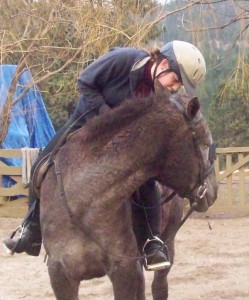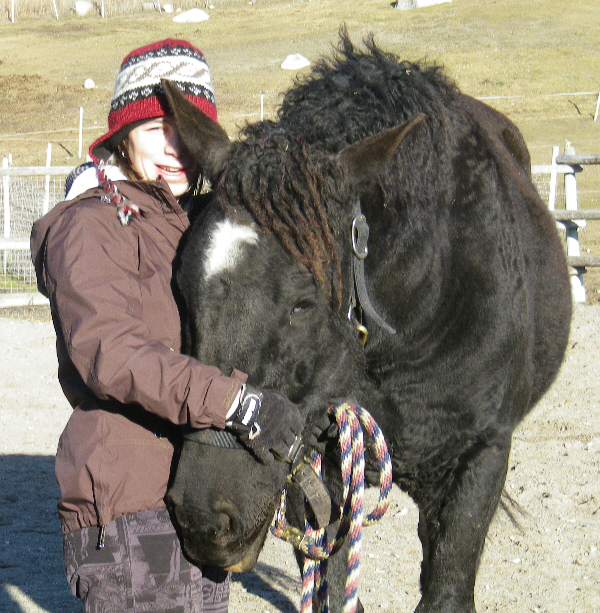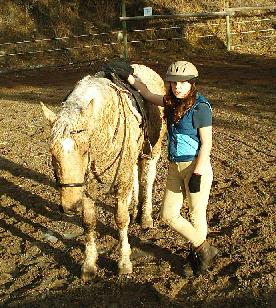Anastasia and *Bijou – one of her favorite Curlies!

Curlies are known to be hypo-allergenic. What this means is that if you suffer from an allergy to horses, like my daughter does (she has a severe allergy), you may be able to enjoy horses again or pursue a life long dream to have a horse. Hypoallergenic, by definition, means “having little likelihood of having an allergic response”, and this is exactly what we have found to be true in our case.
1995 – I decided that it wasn’t fair to my then five year old, growing daughter to continue to have horses – she couldn’t breathe when I came in from the horse, even if I had just been out a very brief time. Even though I had horses all my life and they were a true passion of mine I knew that it wouldn’t be fair to this child who was so, so very interested in becoming a horseperson. So when my old Arabian mare, who I had had for over two decades, passed away I made the decision to abstain from having a horse until my child was out on her own.
2000 – A friend called me to tell me about a beautiful palomino gelding that she had looked at in her search for a horse for her daughter. Her daughter did not choose this horse, but while they were researching this breed that they had never heard of, the American Curly Horse, they came to understand that this horse might be the answer for us. We traveled 14 hours to see this horse in person and it was like a miracle that my daughter had no reaction to him over the two days we spent with him – of course we bought him!! We quickly arranged to have him shipped to us and began our wonderful association with Curlies.
We did some research too and most everything we read about Curlies said that they had exceptional intelligence, train-ability, strong feet, solid bones and that they were an unflappable, non-spooky type of horse. This also has been proven to be true to us, over and over on each and every Curly that we have, we now have several broodmares and stand our own stallions! These truly are exceptional horses – very willing and honest and smart!
If my daughter suddenly did not have an allergy to horses, I doubt we would switch breeds now – Curlies are everything that we could ever want and need in an excellent pony club mount, show horse or trail partner. There are also “great” Curly horses such as *Spartacus and his offspring who are wowing people all over with their incredible warmblood-like performances. Curlies can do it all and are doing it all – put a little curl in your world – you won’t regret it!
Anastasia and our first Curly *Cuervo.
*Chystal and Ana

January 2012 – I wrote an article for a couple of different magazines – it reads like a FAQ of Curlies – here it is:
North American Curly Horses:
Many have heard of them and yet so many people still have not! Or, if they have heard of them there are so many misconceptions about them that much of what Curly breeders and enthusiasts do is answer a lot of questions about them.
So here it is FAQ Curly Horse Style!
Are they really hypoallergenic?
A resounding YES! These wonderful horses with Curly coats have proven to many, many people time after time that they are indeed hypoallergenic – they are less likely to cause an allergic reaction in a person that is known to be allergic to horses.
What does this mean exactly?
This means that if you or someone you know is allergic to regular horses you may be able to have a horse that does not cause an allergic reaction and some will be able to pursue a lifelong dream to own a horse of their own. For many this is a dream come true! Many people are moved to tears when they find out they can safely tolerate these Curly horses.
Where do Curlies come from?
Most of today’s Curlies originate from Mustang herds from the Bureau of Land Management in the United States. Look at the pedigrees of most Curly horses and you will find that they trace to these wild horse and some of them are quite close up. People used to think they came from the Bashkir Region of Russia, and that is why they were called that in the beginning, but we know now that there is no evidence to support that.
Are they all small?
No! Mustangs are generally small horses but today’s Curlies have been crossed with every kind of modern horse you can think of. They come in all sizes and types from elegant, tall sporthorse types to draft to pony, endurance types, western types, gaited, YOUR dream of a type of Curly horse – they do exist.
What can they do?
Curlies can do every type of thing that an equine enthusiast can dream of! They can do sport, jumping, driving, western disciplines, endurance, games, and they are truly wonderful trail companions!
What is their temperament like?
This is surely one of their most amazing attributes. For all the different types available today, most Curlies retain their innate affinity for humans. Many of them will leave their food when they see people coming to visit. They truly seem to enjoy spending time with people. They are highly trainable and intelligent, they usually do not need to be drilled about anything, once they understand something, they have it, they have a great work ethic!
Are these horses only for people with allergies?
No! Many people are finding that they love the solid bone, the train-ability and the gentle nature of the Curly and are they are being used more and more by the general equestrian population.
Are Curlies a breed?
This is a tougher question to answer – a breed, by definition is what is produced when two similarly bred horses are bred together and then you get a similar offspring. In this sense, Curlies do manifest as a breed as they have strong attributes that tend to breed into their offspring. However, today’s modern Curlies are not a specific “type” as one might think of in a Quarter Horse or Arabian (just examples). Today’s Curlies are more like a horse melting pot. Each breeder has selected their stock for the horses that they themselves prefer. Some have out-crossed extensively to create types of horses that they believe are useful in today’s equine disciplines and others have bred only Curly to Curly.
Are all Curly coats the same?
No. They come in a wide variety of coat types, from extremely tight curls, to loose curls to even some with no curls – “smooth coated” Curlies. They are all hypoallergenic though! Not only does their curl type vary, so do their colours – they come in every colour that a horse can be! Curlies grow their curly coats winter and shed their winter coats in the spring.
They have a few other attributes which distinguish them from the rest of the equine population:
Most Curlies have curls in their ears! These curls stay year round.
Most Curlies have full dreadlocked Curly manes – often on both sides of their neck, some will shed these lovely manes in the spring only to grow a full, thick, long mane back again the following winter.
Many Curlies have shorter than expected tails often only reaching to their hocks, but the tails usually are very full.
Most of them have very hard feet and many do not need shoes (depending on terrain and use of course!).
They are hardy horses, most owners find them to be easy keepers.
They have a seemingly natural affinity for people – this is observed by many!
How rare are they?
Curlies are still considered very rare – there are less than 4000 registered horses alive in the world today.
Are they hugely expensive?
Not at all. They range in price the same as most other horses, with young-stock often offered for less. A trained mature horse can range from $2,000.00 up to $20,000.00 for a highly trained show horse.
Where can I find a Curly?
Today you can find breeders throughout North American and Europe. They are also slowly making their way into Australia!
Put a little curl your world!
Article courtesy of Shelly White o/o of the Curly Standard Place in British Columbia, Canada
www.curlystandardplace.com
